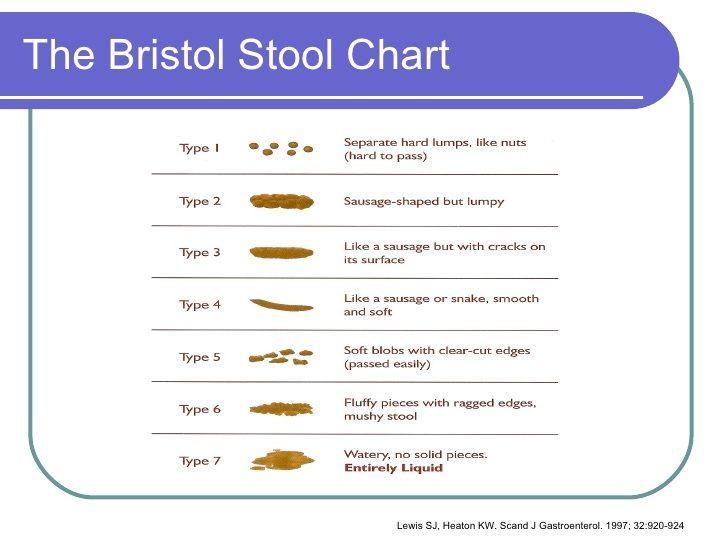An introduction to diarrhoea
Diarrhoea is the frequent passage of loose, watery stools.
By frequently, this generally means opening your bowels four or more times in a 24 hour period; or three or more, with one trip to the bathroom during the night. Each episode will see a substantial amount (more than 200g to be precise) of faeces being passed.
The appearance of your stools can be a good indicator of the health status of your bowels. Generally, stools resembling types 6 or 7 on the Bristol Stool Chart suggest the presence of diarrhoea and inflammation in the gut.

Causes of diarrhoea
There are several potential causes of diarrhoea and understanding these are important in order to better manage your symptoms. Causes can include:
- Infection: This can involve infection by viruses, bacteria, parasites or fungi
- Food poisoning: Eating food contaminated with pathogens
- IBS: Irritable bowel syndrome is often characterised by uncoordinated bowel contractions; if these are too fast diarrhoea is likely
- Food intolerance or trigger foods: In food intolerance we often lack the necessary enzymes required to break down food, the subsequent presence of undigested food in the large bowel can give rise to diarrhoea
- Medical conditions: Crohn’s disease or ulcerative colitis are examples of Inflammatory Bowel Disease (IBD) conditions which are characterised by inflammation of the gut and diarrhoea is a common symptom
- Conventional medications: common culprits include antibiotics, antidepressants and antacids or proton pump inhibitors which often include symptoms such as diarrhoea in their side effects.
Symptoms of diarrhoea
Diarrhoea has some well-known symptoms which include:
- Increased frequency of bowel movements: Generally, if you are opening your bowels four or more times a day or more than three including once during the night, this is classed as diarrhoea
- Bloating: An increased transit time often results in gas getting trapped as waste moves through the gut too quickly
- Pain: Stomach ‘cramps’ are often a feature of diarrhoea which is usually a result of uncoordinated bowel contractions
- Consistency: The consistency of the stools are very soft and watery
- Urgency: Requiring to go to the toilet quickly is commonly associated with diarrhoea
- Dehydration: A very common symptom of diarrhoea, dehydration should be avoided by consuming liquids
- Fever: Suffering from a fever and the symptoms associated with it (including nausea, vomiting, sweating and achy muscles) are commonly associated with diarrhoea and are usually a more direct result of an invading pathogen.
Diarrhoea treatment
There are a variety of approaches you can take to get diarrhoea under control:
- Home remedies: There are some simple measures you can take at home to help manage your symptoms and increase recovery time
- Natural remedies: Certain natural remedies can help specific types of diarrhoea, for example diarrhoea associated with IBS, both in the short- and to manage our symptoms long-term
- Conventional treatments: Conventional treatments can be useful for diarrhoea, for example anti-diarrhoeal medication which can often be effective on a short-term basis.
What warning signs should I look out for?
There are many different reasons why diarrhoea may occur. Below are some warning signs to look out for which can help you to determine how serious your condition is:
- Symptoms present for more than 3-4 days: If symptoms last for more than four days then you could be at severe risk of dehydration and it may be a sign of something more serious. You would be advised to visit your doctor for advice
- Blood in your stools: Either fresh or dried blood (which often manifests in the form of black looking stools) is a warning sign that shouldn’t be ignored. Blood in your stools alongside diarrhoea suggests there is most likely inflammation present in the gut and a more serious condition may have to be considered, for example Crohn’s disease. You should visit your doctor in this case for examination
- Excess mucus in your stools: Mucus can also be a signal indicating inflammation is present in the intestines which may require investigation, especially if making an appearance in excess and when you aren’t passing faeces
- Severe pain: Diarrhoea is often accompanied by a cramping sensation as the muscles of the gut contract more sporadically than normal. However, if the pain is severe or recurrent, you should seek medical advice
- Symptoms appearing after being abroad: If you notice diarrhoea after being abroad it is likely you have travellers’ diarrhoea. Travellers’ diarrhoea is usually caused by consuming contaminated food or water. Often, symptoms disappear on their own after a few days but if symptoms including diarrhoea, are persistent after a few days, you may require some medication to help clear up the infection
- If other symptoms including vomiting or fever are present alongside the diarrhoea. Additional symptoms together with diarrhoea, especially if apparent for a number of days, should be investigated by a medical professional.








